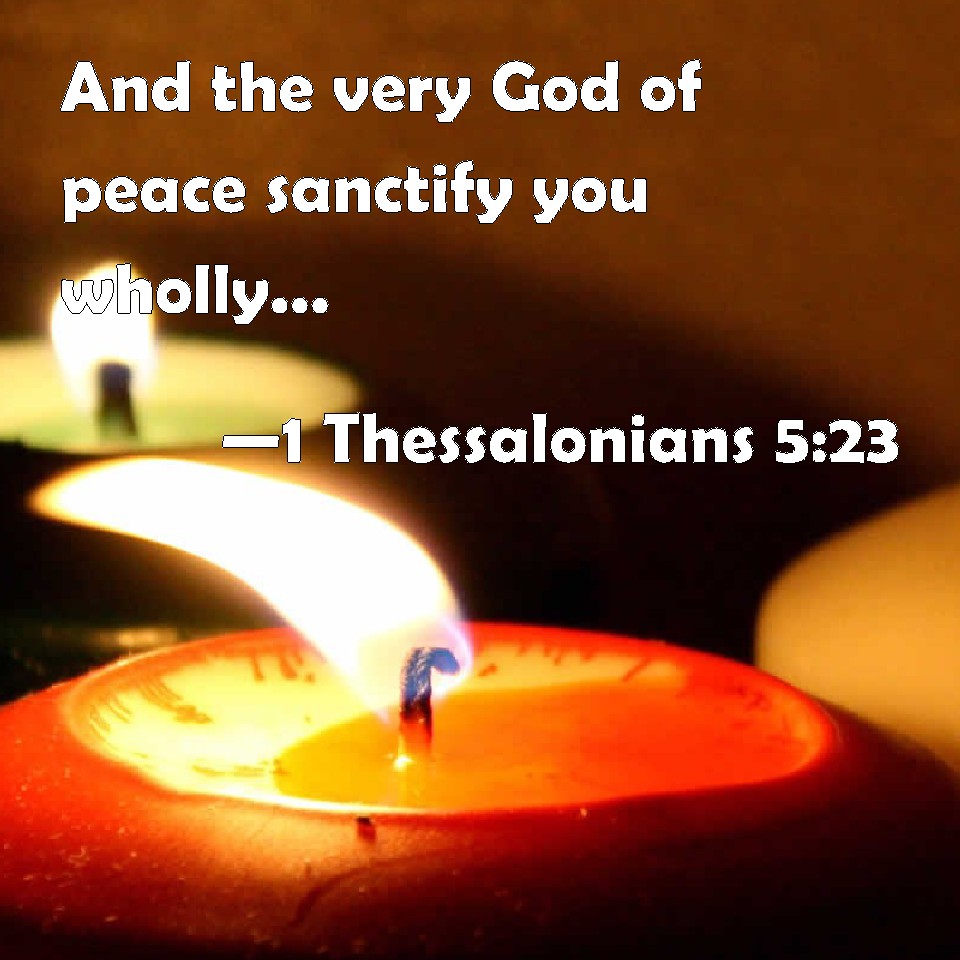THE SEED
“Now may the God of peace Himself sanctify you completely; and may your whole spirit, soul, and body be preserved blameless at the coming of our Lord Jesus Christ.” 1 Thessalonians 5:23
Sanctification: it is plan of God to bring us to perfection after being saved by grace.
“God is interested in the manifestation of His fullness in our life.”
To sanctify simply means to separate or set apart for special use in Holiness. God is calling for sanctification because He does not want us to be messed up by the unclean things of this world. He wants to purify us for His special purpose. Our sanctification is a joint effort that involves us and God. Our Lord Jesus Christ made a plea to God the Father to keep us from the evil one, and make it clear we are not of the world and to sanctify us in truth. John 17:15-17. God is always ready to release His power of sanction, the question is, are we ready to commit ourselves unto God for special use? We must be ready to let go of things that easily lure us away from the presence of God into sin. If we need to get rid of some friends that has no positive impact in our lives, let’s do it quickly. In the past, God granted us justification, for positional holiness in Christ. In the present, God guides us to maturity, a practical, progressive holiness. In the future, God will give us glorification, a permanent, ultimate holiness. This are the three that separate us from the penalty of sin. (sanctification).
BIBLE READING: 1 Thessalonians 5:23
PRAYER: Father let your word duel in me richly
ISỌDIMIMỌ́
IRUGBIN NAA
“Ki Ọlọrun àlàáfíà tikararẹ, ki o sọ yín di mímọ pátápátá, ki a si pá ẹ̀mi ati ọkàn àti ara yín mọ patapata li ailabukù ni ìgbà wíwa Jésù Kristi.” 1 Tesalonika 5:23
Iwa-mimọ jẹ eto Ọlọrun lati mu wa, wá si pipe lẹhin ti a ti gba igbala nipasẹ ore-ọfẹ. Ọlọ́run nífe sí ìfarahàn ẹ̀kúnrẹ́rẹ́ rẹ̀, nínú ìgbésí ayé wa. Lati sọ di mimọ tumọ si lati ya si ọ̀tọ̀ tabi fí fí sí apá kan fun lilo pataki ninu iwa mimọ. Ọlọ́run ń pè fún ìsọdimímọ́ torí pé kò fẹ́ kí àwọn ohun àìmọ́ ayé yìí sọ wa di ẹlẹgbin nípa àwọn ohùn aimo. Ó fẹ́ sọ wá di mímọ́ fún àkànṣe ètò rẹ̀. Ìsọdimímọ́ wa jẹ́ si sapá wa nínú àjùmọ̀ṣe àwa àti Ọlọ́run. Oluwa wa Jesu Kristi bẹbẹ si Ọlọrun bàbá lati pa wa mọ kuro ninu ibi, ki o si fi han gbangba pe a kii ṣe ti aiye ati lati sọ wa di mimọ ni otitọ Johannu 17: 15-17. Ọlọrun ṣetan nigbagbogbo lati tu agbara ijẹniniya rẹ silẹ, ibeere naa ni pe, a ha ti ṣetan lati ya igbesi-aye wa sọtọ fun Ọlọrun bi? A gbọ́dọ̀ wà ní igbaradi láti jọwọ àwọn nǹkan ti o máa ntètè mú ni kúrò lọ́dọ̀ Ọlọ́run bọ sínú ẹ̀ṣẹ̀. Ti a ba nilo lati yọ diẹ ninu awọn ọrẹ ti ko ni ipa rere ninu igbesi aye wa sí lẹ, jẹ ki a ṣe ni kán kán. Iwa-mimọ Oluwa wa jẹ apẹrẹ ati agbara fun tiwa. Ni igba atijọ, Ọlọrun fun wa ni idalare, lẹẹkan fun gbogbo, lati wà ní ipò iwa mimọ ninu Kristi. Ní báyìí, Ọlọ́run ń tọ́ wa sọ́nà sí , ìjẹ́ mímọ́ tó ń tẹ̀ síwájú. Ní ọjọ́ iwájú, Ọlọ́run yió fún wa ni iṣe lógo láti ni ijẹ́ mímọ́ tí yíò wà, pẹ́ títí. Awọn wọnyi ni awọn mẹta ti o ya wa kuro ninu ijiya ẹṣẹ (ìsọdimímọ́).
BIBELI KIKA: 1 Tẹsalóníkà 5:23
ADURA: Baba jẹ́ kí ọ̀rọ̀ rẹ di púpọ̀ nínú mi. Amin.
